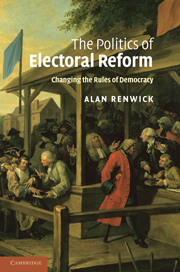Book contents
- Frontmatter
- Contents
- List of tables
- List of figures
- List of abbreviations
- Acknowledgements
- 1 Introduction
- PART I Building blocks
- PART II Elite majority imposition
- PART III Elite–mass interaction
- 9 Italy: diluting proportional representation
- 10 Japan: the abandonment of SNTV
- 11 New Zealand: MMP in a Westminster setting
- 12 Elite–mass interaction: comparative analysis
- 13 Conclusions and implications
- Appendix: glossary of electoral system terminology
- Bibliography
- Index
12 - Elite–mass interaction: comparative analysis
Published online by Cambridge University Press: 04 May 2010
- Frontmatter
- Contents
- List of tables
- List of figures
- List of abbreviations
- Acknowledgements
- 1 Introduction
- PART I Building blocks
- PART II Elite majority imposition
- PART III Elite–mass interaction
- 9 Italy: diluting proportional representation
- 10 Japan: the abandonment of SNTV
- 11 New Zealand: MMP in a Westminster setting
- 12 Elite–mass interaction: comparative analysis
- 13 Conclusions and implications
- Appendix: glossary of electoral system terminology
- Bibliography
- Index
Summary
In at least two of the three countries discussed here, highly respected analysts argued in the late 1980s that major electoral reform was very unlikely (on Italy, see LaPalombara 1987: 234; Spotts and Wieser 1986: 119; on New Zealand, see Boston 1987: 111–12; Lijphart 1987: 102–3). They all did so on the basis of the same logic: the politicians controlled the decision-making process; and the majority of those politicians opposed electoral reform because it would harm their power interests. Yet in all three cases reform did occur, and it did so because popular pressure forced politicians to concede changes that they would not have supported had they been left to their own devices. In this chapter, I analyse the dynamics of the elite–mass interaction reform type in greater detail.
Given the greater complexity of the process of reform by elite–mass interaction than that of elite majority imposition, this chapter is structured somewhat differently from Chapter 8. I begin by analysing in turn each of the three phases, looking at the processes that operate within them and that lead from one phase to another. Only after that do I focus in on the building blocks of the reform process identified in Part I and the propositions that I offered regarding them.
The dynamics of the three phases
We have seen in the preceding chapters that the same three basic phases characterized reform in all three countries: first, a minority of politicians became interested in electoral reform but were unable to persuade the necessary majority of their colleagues to enact change; second, reform advocates therefore sought to rally public opinion behind the reform cause; third, popular mobilization having proved successful, the majority of politicians acquiesced in reforms that they had not previously wanted.
- Type
- Chapter
- Information
- The Politics of Electoral ReformChanging the Rules of Democracy, pp. 210 - 238Publisher: Cambridge University PressPrint publication year: 2010

